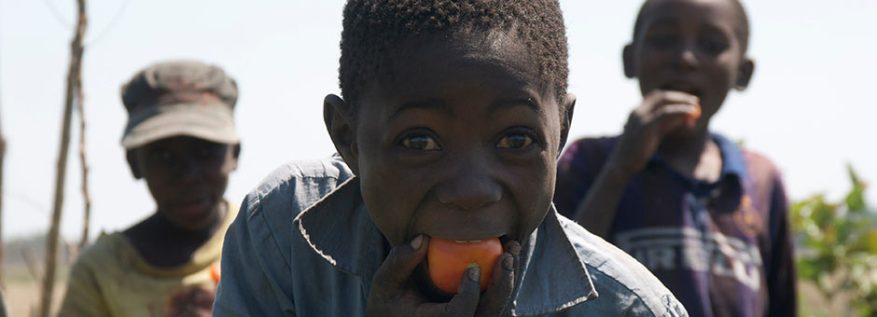Rising out of the surrounding marshes is a hillock on which Chali Mange Llishebo and his sons and nephews are involved in the small-scale commercial production of tomatoes and cabbage.One of 73 local members of the Lui Farmers Commodity Group, his half-acre plot has been a hive of activity in recent weeks, as he harvests and transports up to 15 baskets of his ripening tomato crop for sale in the market in Senanga town and other neighbouring villages.
A father of eight, Chali says that the Lui Farmers enterprise has significantly reduced the financial burden that he faces as a result of the care that he provides not just to his immediate family, but also to five orphaned nephews and nieces, to his 71 year old mother, and to a 95 year old uncle who also lives with his family.
‘My brother died in a car accident a few years ago, and a then sister died following a long illness. Since that time I have been bringing up five of their children alongside my own family. It has been difficult’, he admits.
Chali Mange Llishebe had been supporting his family from the production of rice and maize and a small plot of vegetables, until he joined the Liu Farmers and began to scale up his tomato production activities a year ago.
‘I had been growing tomatoes on this site for five years, but with training that I received as a part of the group, and with seed stock provided for the more durable Tengeru 97 variety brought from Tanzania, it has become a more profitable enterprise’, he says.
Chali’s sons and nephews help him on the farm when they are not at school, and also transport the produce by ox cart to the market – where they sell a basket of tomatoes for 40,000 Zambian Kwacha (€6/£5). He says that although the yield they get from the crop may be marginally less than the production of other kinds of tomato, the Tengeru is more durable, and does not spoil or damage as easily as other varieties.
Chali Mange Llishebo invested in a treadle pump last year to improve the irrigation of his vegetables, and says that this has taken much of the labour out of their work. ‘We have water freely available to us from the wetlands that surrounds this hill, but it still was hard work to draw it up in buckets and water the entire plot’, he said.
Ministry of Agriculture extension officer in Lui Wanyau Maggie Kaongola says that the MORE Project’s efforts to link farmer commodity groups to markets has already had an impact in her area. ‘By working together the producers are not so vulnerable to exploitation from agents and traders, who very often would deliberately drive the price down by waiting until a farmers produce started to spoil, and they ran the risk of getting nothing at all for their crop’, she says.
‘By working together the farmers groups can now even hire transportation to find buyers if they need to, and they are less at risk of exploitation’, she said. Across Lui Wanyau there are a total of 115 households involved with different MORE commodity groups, and virtually all of them believed that their circumstances had improved, and would get better in the future, she added.

